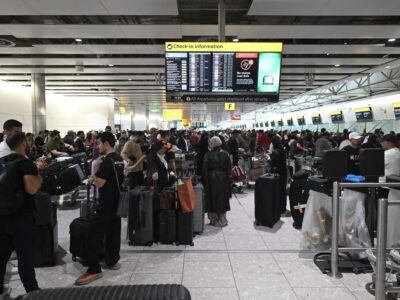Now the dust has settled around Dubai Health Authority’s radical plans, MT gets the measure of the emirate’s new-look funding system.
Dubai’s mandatory health insurance scheme is proving an exercise in hype. In the weeks since its launch, the plan has attracted much fuss and delivered little information. Press headlines have declared ‘healthcare for all’ and ‘universal access’.
For hostile employers who will bear the brunt of any health tax and medical facilities braced for a treadmill-style national service, this is a new breed of health scare. Ask Simon Hodges, a senior adviser on the project, about the coverage and he appears bemused.
“Everyone has latched on to the aspirational picture and expects it to be kicking in on 1 January 2009”, he says. “In fact, very little is going to change. We’re looking at a seven-year roll out.”
We’ll never get a perfect answer to health…because it’s uneconomical.
Dubai’s current healthcare system has been hampered by years of underfunding. The United Arab Emirates (UAE) spends only 2.5% of its GDP on healthcare, less than a third of the spend of high-income western countries and half that of its poorer neighbours Egypt and Jordan.
Hodges’ response sums up the reality of the situation – any reform of the health sector won’t happen overnight.
Supply, demand and politics
The crux of Dubai’s health policy breaks down into two parts: 1) how to force people or employers who can afford medical care to pay out; 2) how to fund adequate medical care for everyone, regardless of their means, without the government footing the bill.
The majority of white-collar Dubaiites don’t stand to gain or lose. For most, their employers will pay their annual health contributions and they will continue to visit the same doctors they always have. For this demographic, admits Hodges, the fee is more a health tax; “Which we are balancing by explaining the benefits of controlling healthcare spending.”
In fact, Dubai Health Authority (DHA) itself is banking on minimal uptake of its health services. The plan offers only modest benefits to patients in its first year – an X-ray and some lab tests – offset by a co-pay to dissuade overuse. It is aimed at, DHA is keen to stress, those for whom money is so tight they skip the doctor in favour of their local pharmacy.
“The benefits we provide are certainly better than nothing, but it isn’t designed for the white collar workers,” says Hodges. “We want those people to stay where they are. The patients you see in 2008, you will be seeing in 2009.”
In principle the plan works. DHA has sidestepped a common mistake, which is to pour money into so-called “vertical” health programmes that address specific diseases such as diabetes or obesity, instead opting for a delivery model grounded in basic healthcare.
By 2012, Dubai should have a broad – largely employer-funded – “horizontal” health system, capable of tackling all forms of ill health. On the flipside, the government may eventually find it has scored an own goal. Evidence from Germany, France and Australia – where much of the inspiration for the Dubai plan is drawn from – showed higher private healthcare spending didn’t cut the demands on public-sector funds.
In fact, it is often associated with increased public spending, potentially due to the competitive dynamic between the two sectors. Still, Hodges is philosophical. “We want to create a health system that allows competition to do what competition does best – improve the system.” Business, heal thyself
Among healthcare providers, much has been made of the funding mechanism behind the insurance scheme. Physicians have talked anxiously about how and when they will be paid, and how much. So far, DHA has resisted nailing its colours to the mast – the exact sum primary care clinics will receive per patient will be revealed in October.
What is clear, however, is that primary care has been cast as the lynchpin of the new system. Medically and economically, argues Hodges, it makes more sense. In a reflection of Britain’s health system, patients will now be referred to specialists via their family physician.
The benefits we provide…aren’t designed for the white collar workers.
What is also clear is that quality of care will now come first. Eventually physicians, clinics and hospitals will be measured on the standard of care they deliver and rewarded accordingly.
“Licensing for all facilities, public and private, will be linked to performance,” says Dr Haider Al Yousef, DHA transition director. “Preventive care, for example, will become a key performance indicator for clinics, and we may have incentives built into the system to encourage this.”
This vision is, however, dependent on private sector clinics choosing to sign up to the scheme. Alone, the public sector does not have nearly enough primary care doctors to meet the anticipated rise in demand. Much will depend on the allocated budget per patient, and how the health scheme is sold to physicians.
For Hodges, the clinical and monetary benefits are transparent. “By the time the system is rolled out in 2012, around 85-90% of healthcare spending in the emirate will be passing through it. To opt out of 90% of an industry’s expenditure is quite a brave move.”
Not only that, but many physicians will have a better relationship with their patients as they are signed to a specific clinic, he adds. “You’ll be able to plan an improved life for that patient…and we can say, with absolute certainty, that you will receive an income.”
Ready to operate
The abiding question is, can Dubai’s industry deliver? In all honesty, DHA does not know. Alongside funding, the key lever it will use to drive health reform is a solid information system. Currently, the Authority is operating blindly and it desperately needs performance data to shape its decisions. That DHA has deep-seated doubts about the health industry’s ability to modernise is clear – it has roped in professional help.
Clinics signing up to the scheme will be obliged to tie-up with a healthcare management company for three years; the first year paid by the government. The move is intended to help level the playing field between public and private units, providing a corporate skill set to spur competition.
As DHA sells it, both sectors will be sparring for patients, creating a lean, mean healthcare machine where rivalry trims away inefficiency. In reality, of course, quality improvement has victims. Some clinics, services, even hospitals won’t survive.
These changes will be painful, even when stretched over a seven-year plan. Still, regardless of the sloganised rhetoric behind all healthcare policy, it is not about philanthropy. Mandatory health insurance is a means to rein in costs and boost productivity for the greater good of Dubai’s economy.
Price, admits Hodges, will dictate the course now and in the future. “We need a healthcare service that will attract people into the economy, but not at such a high price that it makes other activities uneconomic. We’ll never get a perfect answer to health…because it’s uneconomical.







